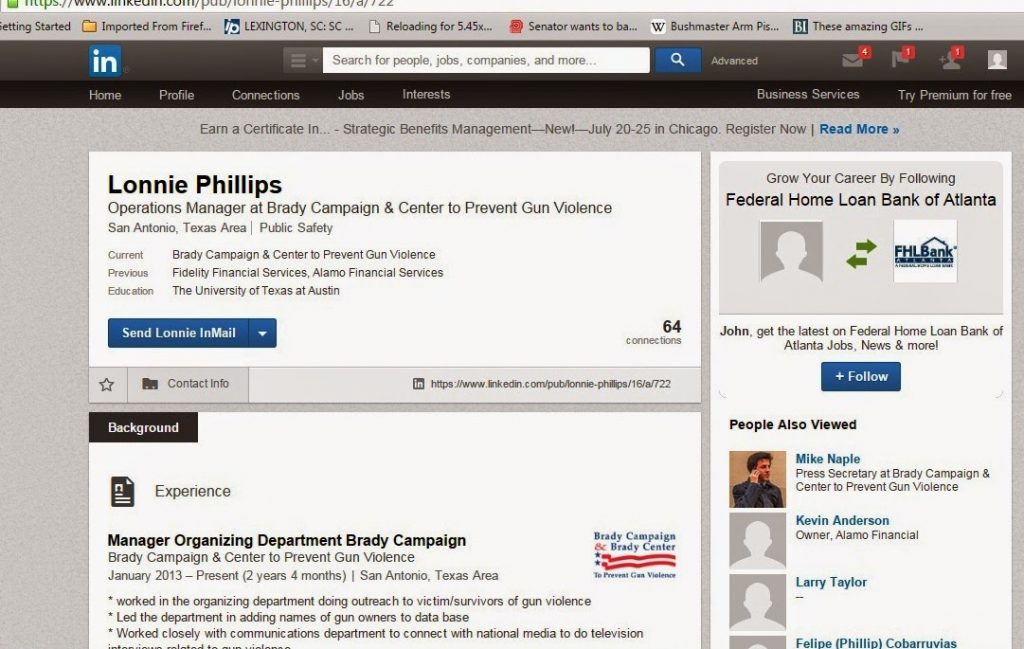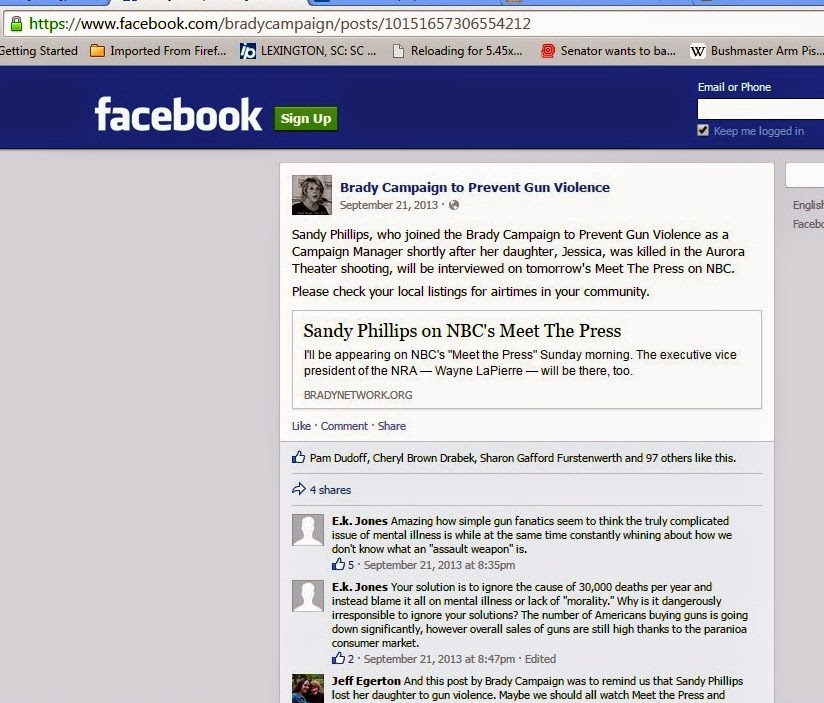The Brady Center To Prevent Gun Violence (sic) has an ongoing project called “Stop Bad Apple Gun Dealers”. Ostensibly this project is meant to go after gun dealers who knowingly allow firearms to go into the hands of criminals, the mentally ill, and straw purchasers. In reality, the goal is to bankrupt mom and pop firearms dealers through extended legal action.
This project was the topic of a presentation by Florida attorney Cord Byrd at 18th Annual Firearms Law Seminar. Byrd discussed the Protection of Lawful Commerce in Arms Act, the statutory exceptions to the qualified civil liability immunity that it provides, and how the Brady Center is seeking to use state courts to pierce the veil of PLCAA’s immunity protection. Byrd then discussed the case of Allen v. Lock N Load where he is the defense counsel to the owners of Lock N Load.
The Protection of Lawful Commerce in Arms Act was passed to stop the many civil cases aimed at gun makers by anti-gun mayors. Congress explicitly called the use of the courts to attack the firearms industry “an abuse of the legal system.” The act provided qualified civil liability protection to gun makers and dealer in both state and Federal courts from the criminal or unlawful misuse of guns and ammo. The law does provide specific exceptions to this qualified immunity.
(i) an action brought against a transferor convicted under section 924(h) of title 18, United States Code, or a comparable or identical State felony law, by a party directly harmed by the conduct of which the transferee is so convicted;
(ii) an action brought against a seller for negligent entrustment or negligence per se;
(iii) an action in which a manufacturer or seller of a qualified product knowingly violated a State or Federal statute applicable to the sale or marketing of the product, and the violation was a proximate cause of the harm for which relief is sought, including–
(I) any case in which the manufacturer or seller knowingly made any false entry in, or failed to make appropriate entry in, any record required to be kept under Federal or State law with respect to the qualified product, or aided, abetted, or conspired with any person in making any false or fictitious oral or written statement with respect to any fact material to the lawfulness of the sale or other disposition of a qualified product; or
(II) any case in which the manufacturer or seller aided, abetted, or conspired with any other person to sell or otherwise dispose of a qualified product, knowing, or having reasonable cause to believe, that the actual buyer of the qualified product was prohibited from possessing or receiving a firearm or ammunition under subsection (g) or (n) of section 922 of title 18, United States Code;
(iv) an action for breach of contract or warranty in connection with the purchase of the product;
(v) an action for death, physical injuries or property damage resulting directly from a defect in design or manufacture of the product, when used as intended or in a reasonably foreseeable manner, except that where the discharge of the product was caused by a volitional act that constituted a criminal offense, then such act shall be considered the sole proximate cause of any resulting death, personal injuries or property damage; or
(vi) an action or proceeding commenced by the Attorney General to enforce the provisions of chapter 44 of title 18 or chapter 53 of title 26, United States Code.
It is the second and third exceptions that the Brady Center is using to try and pierce the veil of qualified immunity. They are trying to use state statutes on negligence and negligence per se to attack the gun dealers. Moreover, they are trying to use the third exception by claiming the dealer knew it was a straw purchase and then made a false entry into his or her bound book.
In the Lock N Load case, Benjamin Bishop used a shotgun to kill his mother and her boyfriend while they slept. The Brady Center alleges that Lock N Load had denied the sale of a shotgun to Bishop after he failed a NICS check whereupon Bishop came back with his friend Gerald Schwab who bought the shotgun. They then allege that Schwab sold the shotgun to Bishop. Because Schwab allegedly bought the shotgun while accompanied by Bishop, Brady lawyers contend that Lock N Load should have known this was a straw purchase.
It should be noted that BATFE found that Lock N Load did nothing wrong in this case. Moreover, the State’s Attorney for Pinellas County made the same finding.
In bringing these cases, the Brady Center attorneys are assisted pro bono by lawyers with large law firms. In this case, it is attorneys from the international law firm of White and Case which has 38 offices in 26 countries. It has US offices in LA, New York, Silicon Valley, Washington, and Miami. They have approximately 1,900 attorneys. By contrast, Cord Byrd is a solo practitioner in Jacksonville Beach, FL concentrating on civil litigation.
This use of pro bono attorneys from major law firms to attack the PLCAA has given me the idea for a series of blog posts. I will be profiling what I call “Bad Apple Lawyers”. These are the attorneys who either work for the Brady Center or for these major law firms who are, to be blunt, conspiring to steal our Second Amendment rights. It is past time to shine the light of day on these anti-civil rights attorneys. Fortunately, LinkedIn, Google, and the law firm’s own web pages give plenty of info about these attorneys.
I will be starting this series with Jonathan Lowy who heads the Brady Center’s Legal Action Project and who was just forced to withdraw from one of their cases in Wisconsin for violating Wisconsin’s rules of professional conduct concerning trial publicity



